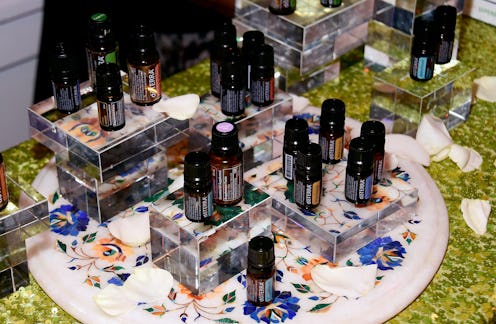
Making your own beauty products has some serious health benefits for your bod and your wallet. The natural beauty craze has been alive and well for centuries, but just like alternative medicine being introduced into the Western World, you have to know how to use it for it to be effective. There are literally giant encyclopedias which give you all the info you need to know about every oil that we have at our disposal. Some oils grow naturally on U.S. soil, lavender or basil for example. Then there are others like argan oil that we have to import from other countries. These usually have with a unique extracting process that hasn't changed for centuries.
The first time I used tea tree oil, I gingerly spread it all over my face. My face was prone to breakouts at the time, so I figured that tea tree everywhere was going to heal and prevent my adult acne. My face didn't yield the results I had hopes for — in fact, I noticed new blemishes popping up frequently. As it turns out, the oil I had purchased was diluted with vitamin E. Tea tree oil, unlike most essential oils, doesn't need to be diluted, and I had already ruled out the use of vitamin E specifically for my face, because it tends to clog my pores. Not all oils are created the same, read the fine print on the back to verify extra ingredients and make sure you purchase a natural product.
Oils don't typically come with a tutorial on how to use them, and most essential oils need to be diluted with a carrier oil. The lovely thing about most oils is that the risk of infection and/or irritation is pretty mild. To get a carrier or essential oils full nutrients, and skin and hair benefits, check out some great tips.
The Science Factor
The sad truth is that there is limited research conducted on essential and carrier oils. This may be at least partially because research is typically paid by big companies that are looking to have science back a new product or chemical that they are introducing into a treatment, rather than confirming nature is the best medicine. According to Crunch Betty's website, since most essential oils cannot be patented, most drug companies aren't trying to waste money finding and proving it's health benefits. This is definitely why dermatologists are recommending prescription strength topical treatments instead of telling you about the wonders of tea tree oil. Unfortunately, nature is too broke to fund its own research.
The Allergy Effect
I've mentioned previously that if you have a nut allergy to avoid essential oils like sweet almond oil or carrier oils such as argan oil. If you suffer from an allergy when ingesting certain ingredients, you certainly don't want to apply it on your face or hair. This is a bonus tip for buying OTC products — I've often fallen victim to a rash because I purchased a body scrub that ended up containing almond oil in the very small printed ingredients.
Essential Oils Aren't Here Forever
Essential oils are absorbed easily by your skin, they revitalize, heal, and restore before leaving your system. This means that yes, you need to be diligent about using your natural remedy every day before you see results. However, since it heals rather than covering up the problem, your skin doesn't get addicted to it. Here's an example: If you previously were using tea tree oil for acne daily and after a few months, your acne is under control, you can dial back your treatment to once a week. Unlike many OTC acne treatments, once an essential oil has done its job, the issue you were solving isn't going to come back just because you reduce your oil usage.
Using a Carrier Oil
Previously, when I've discussed making your own oils from spices (like basil or garlic), I've mentioned to extract the essential oil and mix it with your favorite carrier oil. These vegetable-based oils dilute the potency of the essential oil, which can seriously irritate sensitive skin if you put it on straight. It's best to do a test strip with your diluted essential oil to ensure your skin reacts pleasantly to the nutrients before slapping it on your face.
On the flip side, most carrier oils can be used individually for their own awesome purposes. Coconut and EVO are great carrier oils, but they also have some serious hair and skin care benefits. Coconut oil, specifically, can be used as a moisturizer, sealant, and shaving cream on its own. In addition, there are some carrier oils that most benefits when heated. Example: If you are extracting your own garlic oil, avoid using castor or grape seed as they lose their sought after qualities when heated.
Fragrance Oil
I can't really find a time where purchasing an oil that said "fragrance" on it would be appropriate. Even if I wanted to make my own scent, I would still purchase an essential oil, since fragrances are made from aromatic compounds from essential oils or are mostly synthetic. Often, they tend to be diluted with mineral oil which is not going to be your skin jam. There are so many essential oils that help improve mood support and memory, if you are going for a "natural" scent, try to use an essential oil and dilute it yourself with a natural carrier oil instead of going for a synthetic product.
If you are looking to know everything about oils for hair and skincare, check out a few tips from Crunchy Betty's site; there is a world of information about carrier, essential, AND fragrance oils.